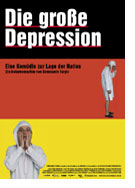

Opening 1 Sep 2005
Directed by:
Konstantin Faigle
Writing credits:
Konstantin Faigle
Director/writer Konstantin Faigle worries about bringing his unborn child into a country burdened with so much pessimism and depression, as well as an estimated EUR 16,500 debt per baby born in Germany. Former German President Johannes Rau remarked that he had never seen a country so pessimistic. Faigle begins a journey into the character of the German people to determine the source of so much hand-wringing and complaining. He interviews German psychologists, sociologists and theologians, including Alice Schwarzer, a well-known women’s rights activist, to determine if the reason is genetic or can otherwise be explained.
A 2004 poll showed that the happiest Germans live in Starnberg, near Munich – Hamburg was further down the list. Thus Faigle embarks on his road trip through Germany to examine the possible reason for the difference in happiness within the country. He interviews tourists for their input on the German personality; two British women shared that the Germans just took everything too seriously – that they couldn’t laugh easily at life like the British. A Japanese visitor complimented the Germans for their technical know-how but noted their tendency to seem arrogant. Faigle interviews his own parents and takes his father for a ride in an expensive convertible to test the German capacity for envy.
Faigle includes pertinent historical information through innovative puppetry and impersonation, including portrayals of King Ludwig and Barbarossa. He wonders if the people would prefer having a king again and tests that thought on visitors at Neuschwanstein. Another suggestion is to have the Germans intermarry with a happier race, that of India for example, to raise a happier generation of offspring.
This is a humorous look at a subject that deserves serious thought. If every viewer would hold back his or her initial reflex to criticize and complain and could see the glass as half full rather than half empty, then Faigle will have achieved his goal, ah, the power of positive thinking. Faigles’ first documentary Out of Edeka won the 2002 Bavarian Documentary film prize. (Patricia Ritz)